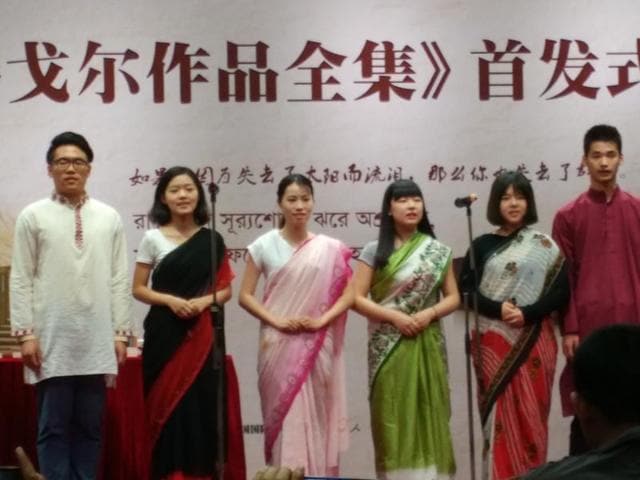Tagore’s novels, plays translated into 16 million Chinese characters
Chinese experts toiled for six years to translate Rabindranath Tagore’s novels, poems, essays and plays into 33 volumes with 16 million Chinese characters.
Six years, 18 Chinese translators fluent in Bengali and a fair amount of passion.

That’s what it took for Rabindranath Tagore’s works – novels, essays, poems and plays – to be translated for the first time from Bengali into 16 million Chinese characters.
The 33 translated volumes were released on Thursday afternoon at a function at the China Radio International (CRI) office in Beijing, where Chinese students sang Tagore’s songs, elderly Chinese professors spoke of his humanism and the translators shared moments of their hard work.
The release was aimed at commemorating Tagore’s 155th birth anniversary on May 7.
Officially, it took six years but the groundwork began in 2009. “I got my first script to be translated when I was studying at Dacca University in 2009,” said Cao Yan Hua, deputy director of CRI’s Bengali department.
“The work actually began then,” said Cao, whose Bengali name is Shuborna.
Watch | Interview with one of the Chinese translators
In 2011, the Chinese government gave its stamp for the venture, making it a “Cultural Project” under the 12th five year plan, which meant it had to be completed between 2011 and 2015.
It was. And in April, China’s biggest state-run printer, the People’s Publishing House, came out with the volumes.
But there were problems.
One, there was no Bengali-to-Chinese dictionary. So translators, Cao said, had to carefully translate thousands and thousands of words first from Bengali to English, and then from English to Chinese.
“When there were disagreements about the meanings, the group would meet. We had many such meetings,” she said.
The translators juggled the project with their day jobs. The money – 60 Yuan (Rs 600) for 1,000 Chinese words – was a pittance. But the passion made up for it.
About half the translators were current and retired Bengali experts of the CRI. Bengali experts from China’s national news agency Xinhua, the foreign ministry, the Communist Party’s party school and the People’s Liberation Army too were part of the project.
Shi Jing Wu, a retired CRI director now in his seventies, worked as a translator and an editor.
“I had translated Tagore before. But this was special. This was the first time we were translating from Bengali to Chinese. Except Tagore’s songs, we translated everything,” Shi said.
Tagore visited China three times in the 1920s and 1930s. But his visits were contentious, with eminent Chinese scholars of the time debating his philosophy and worldview.
“True, but his philosophy and humanism have stood the test of time. Besides being an author and a poet, he was an educationist who spoke and wrote about a world philosophy,” Shi told HT, adding he “spent some happy and proud times” doing the translation.
At 5000 Yuan (approximately Rs 50,000), the volumes are aimed at universities and institutions. But abridged versions of novels and collection of poems are available for 20 Yuan (Rs 200).





